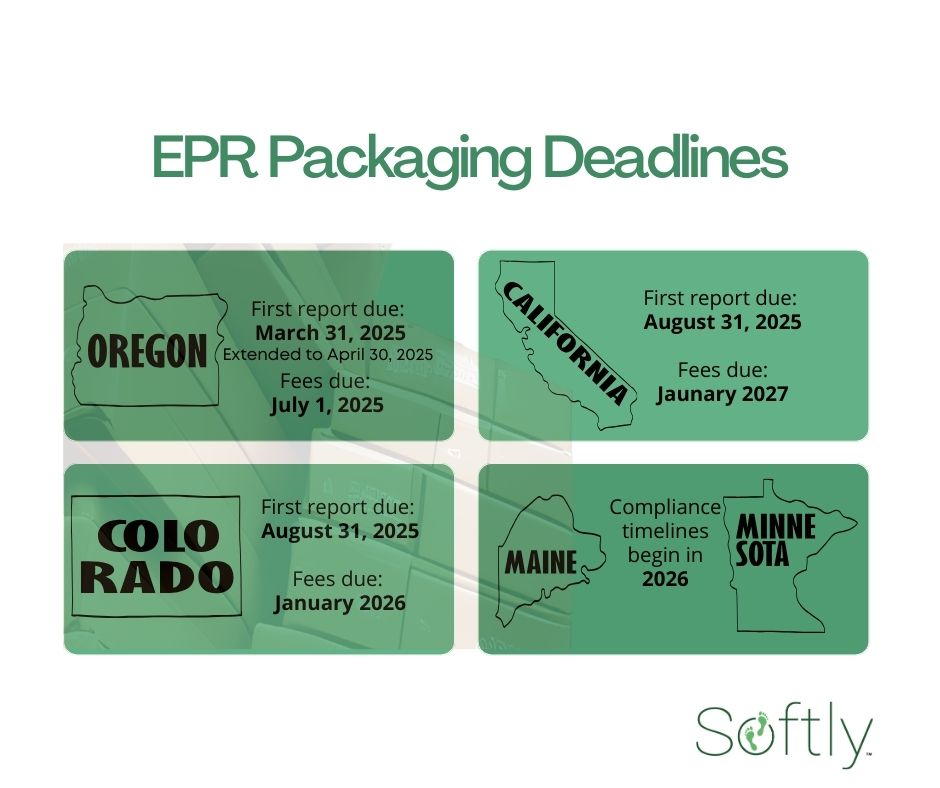What do the new state Extended Producer Responsibility (EPR) packaging laws mean for your business—and who’s going to help you navigate them? While these laws can seem complex at first, understanding a few key elements and deadlines can make compliance much more manageable. In our previous post, EPR Laws: What is Your Responsibility?, we introduced the basics. Now, we’re taking a closer look at packaging-specific EPR laws. So far, five states—Oregon, Colorado, California, Minnesota, and Maine—have enacted EPR packaging legislation, with more expected to follow.
Deadlines are Here
EPR packaging legislation covers plastics, paper and cardboard, glass, and metals. They hold producers accountable for the entire lifecycle of packaging—from product creation to end-of-life disposal. The new EPR laws’ requirements to collect, recycle, and dispose of their products mean additional costs to manufacturers, but they can also create opportunities for manufacturers to design new products that are easier to recycle or biodegradable. EPR laws increase risks through higher costs, but by creating innovative packaging designs, you can mitigate the risks of EPR implementation and potentially generate new business opportunities.
Extended Producer Responsibility Deadlines are being enacted state-by-state. If your business is selling or operating in the five states that have packaging EPR laws, it is essential to stay up-to-date on reporting and fee deadlines. These fees help cover the costs of collecting, sorting, and recycling packaging, and they must be paid to a Producer Responsibility Organization (PRO). Your report will need to demonstrate that you are complying with EPR rules, including the quantity and type of products sold, the amount being collected, and your recycling goals.
Now is the time to ensure compliance and integrate sustainable packaging solutions.

Stay informed and prepared! Softly Solutions can help you navigate these new regulations. Use Softly’s Green Claims Navigator to learn which EPR regulations are relevant to your business. The Green Claims Navigator has the latest information about EPR laws and other regulations relevant to your green claims.
Who is a Producer?
Definitions of a producer can vary by state, but in essence, a producer is an entity that manufactures, imports, or sells products that utilize packaging materials.
You can begin by asking these questions:
- Is your brand name on the packaging?
- Is the packaging company’s name on the packaging?
If your company’s name is on the packaging, you may be considered a producer and need to abide by the EPR laws. If the packaging company’s name is on the packaging, they would probably be considered the producer. Exceptions vary by state, so it is important to consider local regulations.
Fulfilling Your Responsibility
Under Extended Producer Responsibility laws, you, as a producer, are responsible for collecting, recycling, and disposing of your products. You will either directly fund waste management systems or pay through fees to PROs to cover the costs.
EPR laws are designed to promote circularity. To maximize the benefits of complying with the new regulations, consider the following.
- Source your materials to promote sustainability: Prioritize recycled or renewable content to ensure a continuous flow in the market.
- Consider Design: Make designs that encourage proper disposal.
- Communicate the benefits of circular design: Educate consumers about the correct methods of disposal to enhance collection and recycling efforts.
- Encourage Collection: This may include programs for recycling facilities or collaboration with external organizations.
It is essential to inform your customers and suppliers about the requirements of EPR and its impact on your business. Look for practical solutions, such as new designs that can reduce the risks and costs associated with implementing EPR. By managing the responsibilities of reporting product amounts, collection efforts, and recycling goals on time, you will not only meet legal obligations but also help promote sustainable packaging. Being proactive in these efforts supports the larger goal of reducing environmental impact through responsible recycling and waste management.
Information provided is for general purposes only and not legal advice; consult a qualified attorney for personalized guidance. Softly disclaims any liability for actions based on this information.
